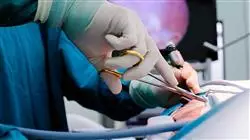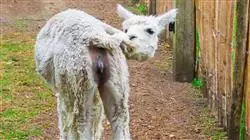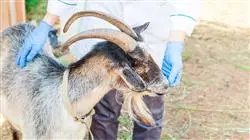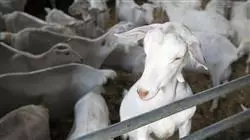University certificate
The world's largest faculty of veterinary medicine”
Description
The most complete and up-to-date knowledge in Ruminant Cardiorespiratory, Gastrointestinal and Urinary Diseases, in a practical and real program that makes the difference"

Ruminant Cardiorespiratory, Gastrointestinal and Urinary Diseases are highly variable, even in cases that initially appear to be mild, it is common to see rapid deterioration of the individual, marked decrease in production and, in the case of infectious-contagious problems, which occupy the first place among respiratory diseases, the possibility of contagion and group affectation, with substantial losses for the producer.
Consequently, the rapid recognition of the main diseases affecting the respiratory tract, the cardiovascular system and the lymphatic system must be intervened in a timely manner, in order to allow early diagnosis and the implementation of control and treatment measures for affected animals, as well as to prevent transmission to other animals (in the case of livestock herds), seeking to minimize losses and restore the health of affected individuals and the entire farm.
Additionally, the causes of diarrhea in bovines, which also represent a very common pathology, as well as its diagnosis and treatment, examination and main pathologies of the digestive tract of small ruminants will be discussed. In-depth knowledge of these disorders is essential for the ruminant veterinarian to be able to diagnose, treat and prevent them in the individual and in the rest of the farm.
Likewise, this postgraduate diploma covers specific genitourinary diseases in bovines and small ruminants; some of them relatively frequent in the veterinarian's clinic of these species, such as urinary obstruction in male goats. The knowledge acquired in this program specializes the veterinarians in the diagnosis, treatment and prevention of these alterations, which are fundamental for their daily practice.
Essential yet rare training for the specialist veterinary clinician that will set you apart as a specialist in this field of work"
This postgraduate diploma in Ruminant Cardiorespiratory, Gastrointestinal and Urinary Diseases contains the most complete and up-to-date scientific program on the market. The most important features include:
- The latest technology in Online teaching software
- A highly visual teaching system, supported by graphic and schematic contents that are easy to assimilate and understand
- Practical cases presented by practising experts
- State-of-the-art interactive video systems
- Teaching supported by telepractice
- Continuous updating and recycling systems
- Autonomous learning: full compatibility with other occupations
- Practical exercises for self-assessment and learning verification
- Support groups and educational synergies: questions to the expert, debate and knowledge forums
- Communication with the teacher and individual reflection work
- Content that is accessible from any fixed or portable device with an internet connection
- Supplementary documentation databases are permanently available, even after the program
With the experience of working professionals and the analysis of real success stories, in a high-impact training"
Our teaching staff is made up of professionals from different fields related to this specialty. In this way, TECH makes sure to offer professionals the up-to-date objective it intends. A multidisciplinary team of professionals trained and experienced in different environments who will develop theoretical knowledge efficiently, but, above all, will provide students with practical knowledge derived from their teaching experience: one of the differential qualities of this program.
This mastery of the subject is complemented by the effectiveness of the methodological design. Developed by a multidisciplinary team of e-Learning experts, it integrates the latest advances in educational technology. In this way, the student will be able to study with comfortable and versatile multimedia tools that will give them the operability they need in their training.
The design of this program is based on Problem-Based Learning: an approach that conceives learning as a highly practical process. To achieve this remotely telepractice will be used: with the help of an innovative system of interactive videos and learning from an expert you will be able to acquire the knowledge as if you were facing the case you are learning at that moment. A concept that will make it possible to integrate and fix learning in a more realistic and permanent way.
The clinical, specialized and advanced fundamentals, based on veterinary evidence, that will allow you to face the daily intervention in cattle and ruminants"

Supported by evidence, the approach of this program will allow you to learn in a contextual way and acquire the skills you will really need in your daily practice"
Objectives
The completion of this postgraduate diploma provides the veterinary professional with specialized and advanced clinical fundamentals, based on evidence to face the daily clinical practice in cattle and ruminants.
Additionally, to this up-to-date approach to the problems encountered in daily clinical practice, the bibliography provided and the structuring of the topics will allow you to keep this knowledge up to date.

The postgraduate diploma in Ruminant Cardiorespiratory, Gastrointestinal and Urinary Diseases will allow veterinary clinicians to update and expand their skills with the quality of the largest online university in the world"
General Objectives
- Establish an appropriate methodology for the screening of ruminants with cardiovascular, respiratory and hemolymphatic problems
- Identify all clinical signs associated with cardiovascular, respiratory and hemolymphatic diseases in ruminants
- Address the main cardiovascular, respiratory and hemolymphatic pathologies affecting ruminants, their diagnosis and treatment
- Develop specialized knowledge on the most common gastrointestinal problems in ruminants
- Specify all clinical signs associated with each gastrointestinal disease
- Analyze the specific clinical approach to each gastrointestinal pathology
- Determine the prognosis and the most appropriate treatment in each case
- Examine the physiological functioning of the urinary system
- Establish an appropriate methodology for examination of the patient with urinary and renal problems
- Identify all clinical signs associated with kidney disease
- Establish the specific clinical approach to patients with renal disorders
- Determine the methods of physical and chemical containment for the development of the clinical activity
- Examine the different methods of diagnostics and research within the herd
- Specify the existing treatments useful for the treatment of ruminant pathologies
- Analyze the importance of analgesia in ruminants, the basis of animal welfare and the management of diseases that usually cause pain in ruminants
- Establish the economic and health impact of pain in animals and its repercussion on production
- Generate specialized knowledge on identification and treatment procedures specific to ruminants, in order to reduce, treat or avoid pain in our veterinary management
- Develop the main analgesic techniques and procedures applied in ruminants
Specific Objectives
Module 1. Cardiovascular, Respiratory and Hemolymphatic Diseases in Ruminants
- Examine how to perform a complete physical examination of the cardiovascular, respiratory and hemolymphatic systems
- Understand the diagnostic procedures used in suspected cardiovascular, respiratory and hemolymphatic pathology, and the interpretation of their results
- Accurately recognize the clinical signs of pathologies of the cardiovascular, respiratory (upper or lower respiratory tract) and hemolymphatic systems
- Determine the main causes of disease of the cardiovascular, respiratory and hemolymphatic systems in cattle, sheep and goats
- Examine the necessary and triggering factors of traumatic reticulopericarditis and Bovine Respiratory Syndrome (BRS)
- Identify the main pathogens involved in the development of BRS and know their relative importance within the complex
- Determine the epidemiology and clinical significance of bovine leukosis and anemia in small ruminants
Module 2. Ruminant Gastrointestinal and Urinary Tract Diseases
- Recognize the clinical signs of the main pathologies affecting the gastrointestinal system of ruminants
- Study the main gastrointestinal pathologies affecting bovines
- Examine the typical signs of diseases affecting the oral cavity of cattle and their possible differential diagnoses
- Analyze the mechanisms of the different causes of indigestion in cattle
- Establish action protocols for cattle suffering from abomasal displacement
- Identify clinical signs and therapeutic options for the main causes of intestinal obstruction in cattle
- Specify the diagnosis of diarrhea in cattle
- Establish treatment protocols for cattle with diarrhea
- Develop the main gastrointestinal pathologies affecting small ruminants
- Generate specialized knowledge to perform a clinical examination of a patient with urinary and renal problems
- Identify the alterations inherent to the different renal diseases
- Establish an appropriate diagnostic plan for the main clinical manifestations of renal problems
- Correctly diagnose the different renal problems and issue a prognosis for these animals
- Determine a treatment plan, both short and long term, for major urinary and renal problems
Module 3. Clinical Skills
- Compile the methods of containment in bovine animals
- Determine the basic material for a ruminant clinical veterinarian
- Identify problems at the collective level
- Establish the basis of diagnosis and know the special diagnostics in ruminant medicine
- Specify antimicrobial therapies by means of laboratory studies
- Analyze fluid therapy as a daily work tool
- Demonstrate the different analgesic therapies in ruminants
- Propose different anesthetic and sedation protocols at systemic and local level
- Review particular analgesia and sedation protocols in ruminants
- Diagnose the main pathologies that cause pain and the techniques or drugs necessary for their treatment
- Enable the student to establish the pharmacological therapeutic treatments or specific techniques in exploratory and/or surgical procedures necessary for each pathology

A unique specialization program that will allow you to acquire advanced training in this field"
Postgraduate Diploma in Cardiorespiratory, Gastrointestinal and Urinary Diseases of Ruminants
Cardiorespiratory, gastrointestinal and urinary diseases are common health problems in ruminants, which include animals such as cattle, sheep, goats and deer. These diseases can have a significant impact on animal production and welfare, and require proper care and management to prevent and treat effectively. Would you like to work in this field? Then the Postgraduate Diploma in Cardiorespiratory, Gastrointestinal and Urinary Diseases of Ruminants created by TECH Global University is perfect for you. In this comprehensive program, taught in 100% online mode, we will explore in detail the most common diseases affecting ruminants, focusing on their cardiorespiratory, gastrointestinal and urinary systems. You will gain the theoretical and practical knowledge necessary to effectively diagnose and treat these conditions.
Get your degree from the largest online veterinary school in the world.
This Postgraduate Diploma will prepare you to meet the clinical challenges faced by ruminant veterinarians. Our expert teaching team of veterinarians with extensive experience in ruminant medicine will guide you through the Postgraduate Certificate, providing you with up-to-date information and the latest advances in the field. As you progress through the program, you will learn how to interpret clinical signs, perform physical examinations and use diagnostic imaging techniques to identify disease in these areas. Upon completion of the Postgraduate Certificate, you will be equipped with the tools necessary to make accurate diagnoses, implement effective treatments and improve the health and welfare of ruminant animals. You will achieve all this without having to leave home, with the best teaching tutorials and interactive material that will give you that rewarding plus to your professional profile.







